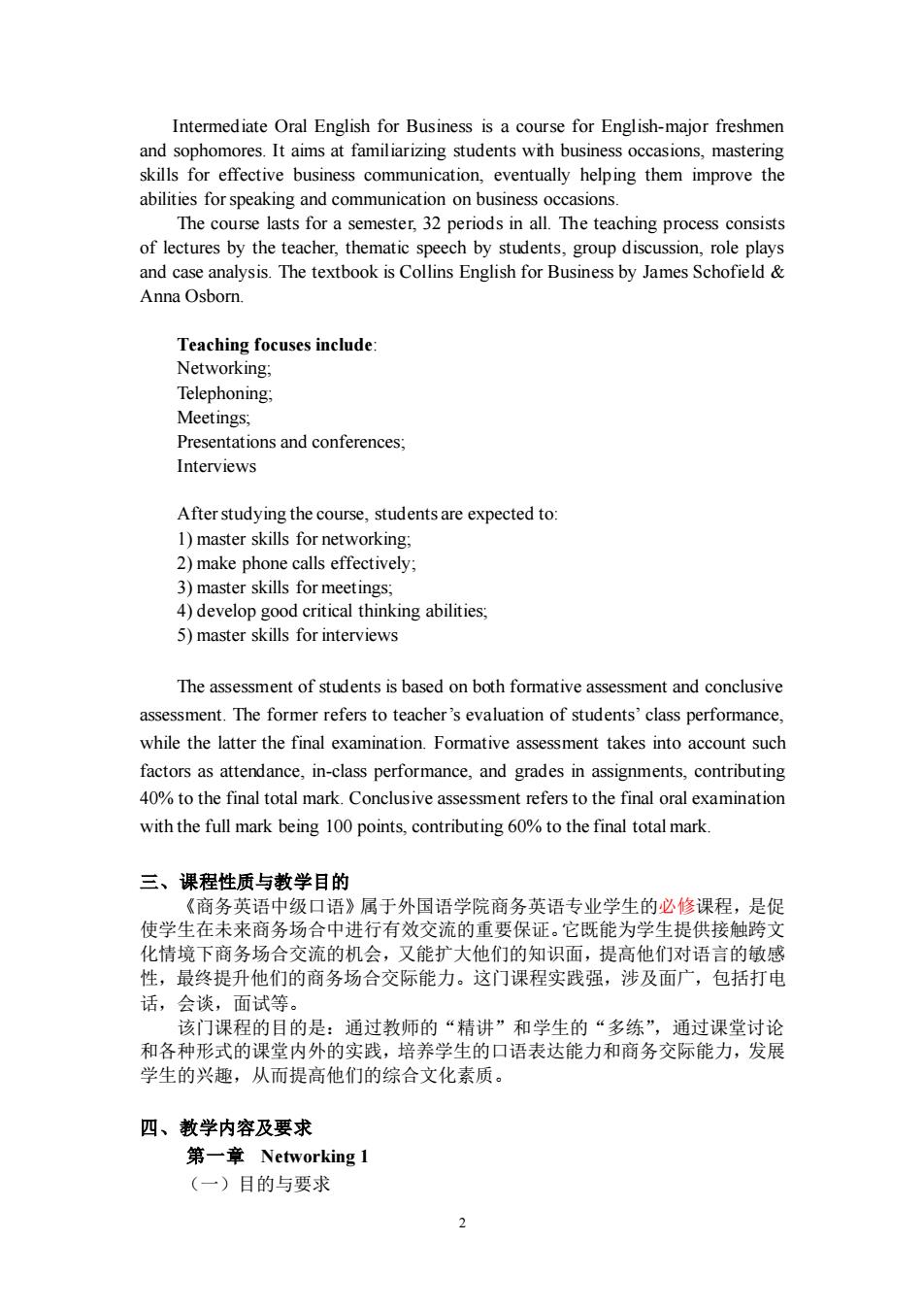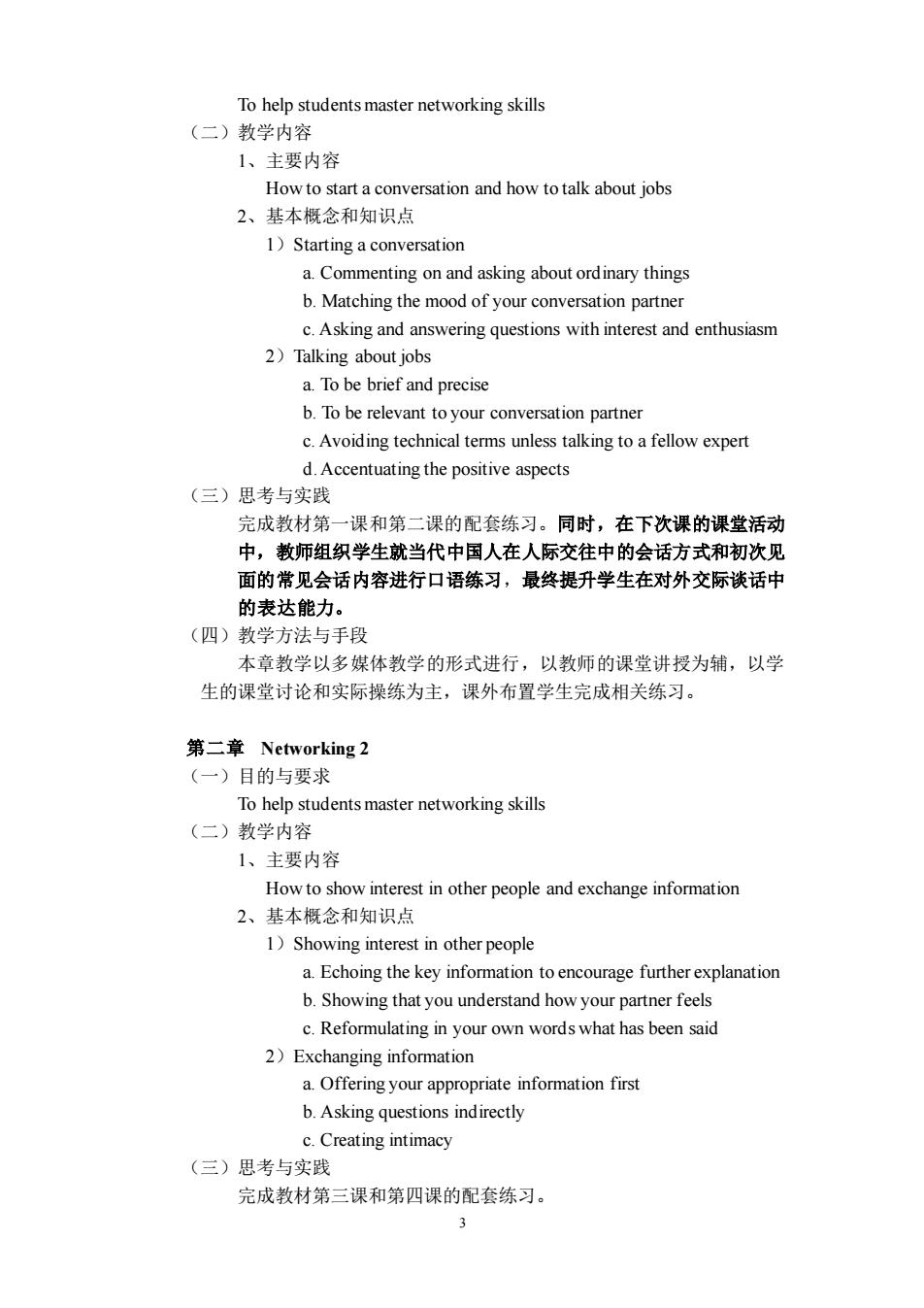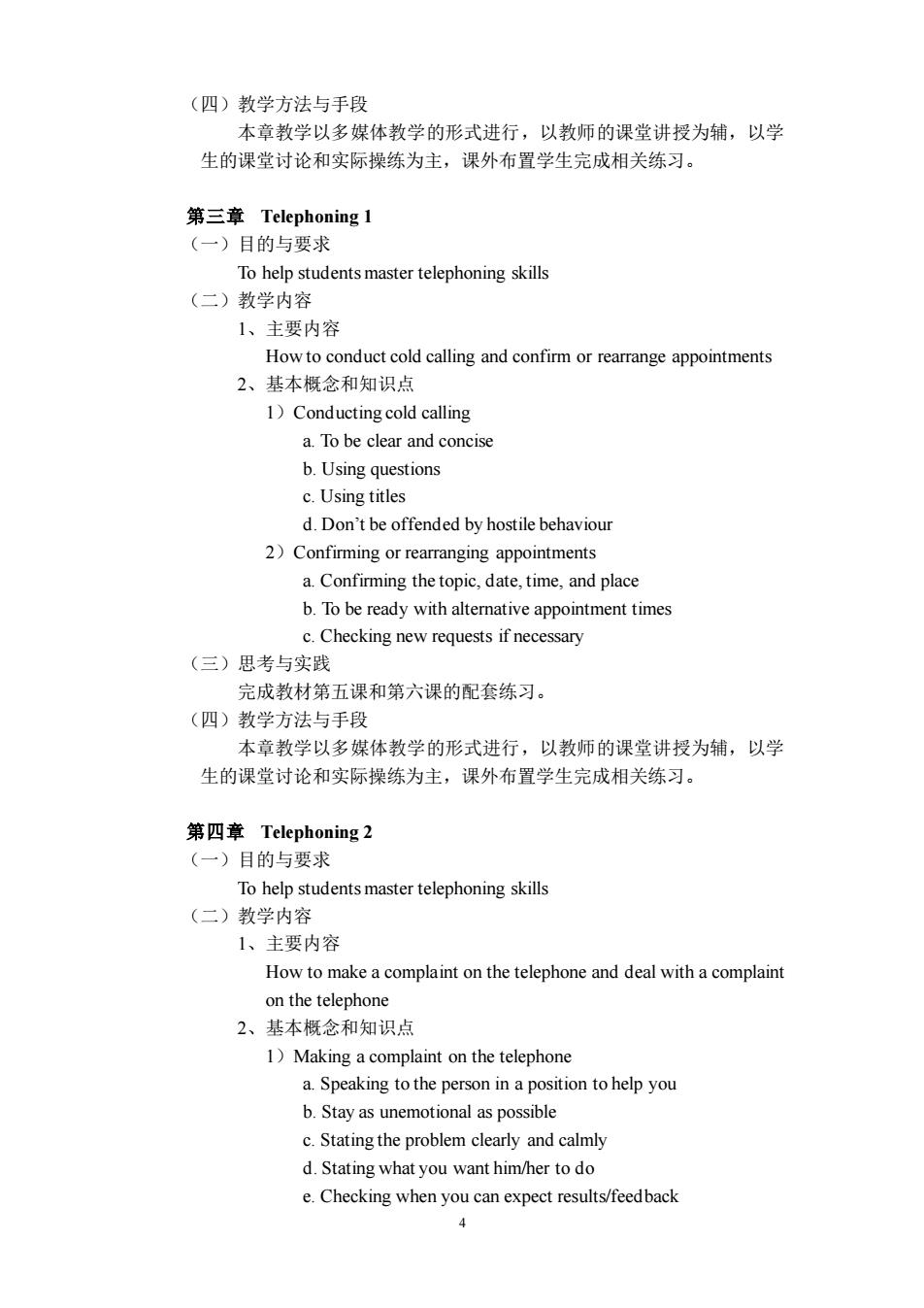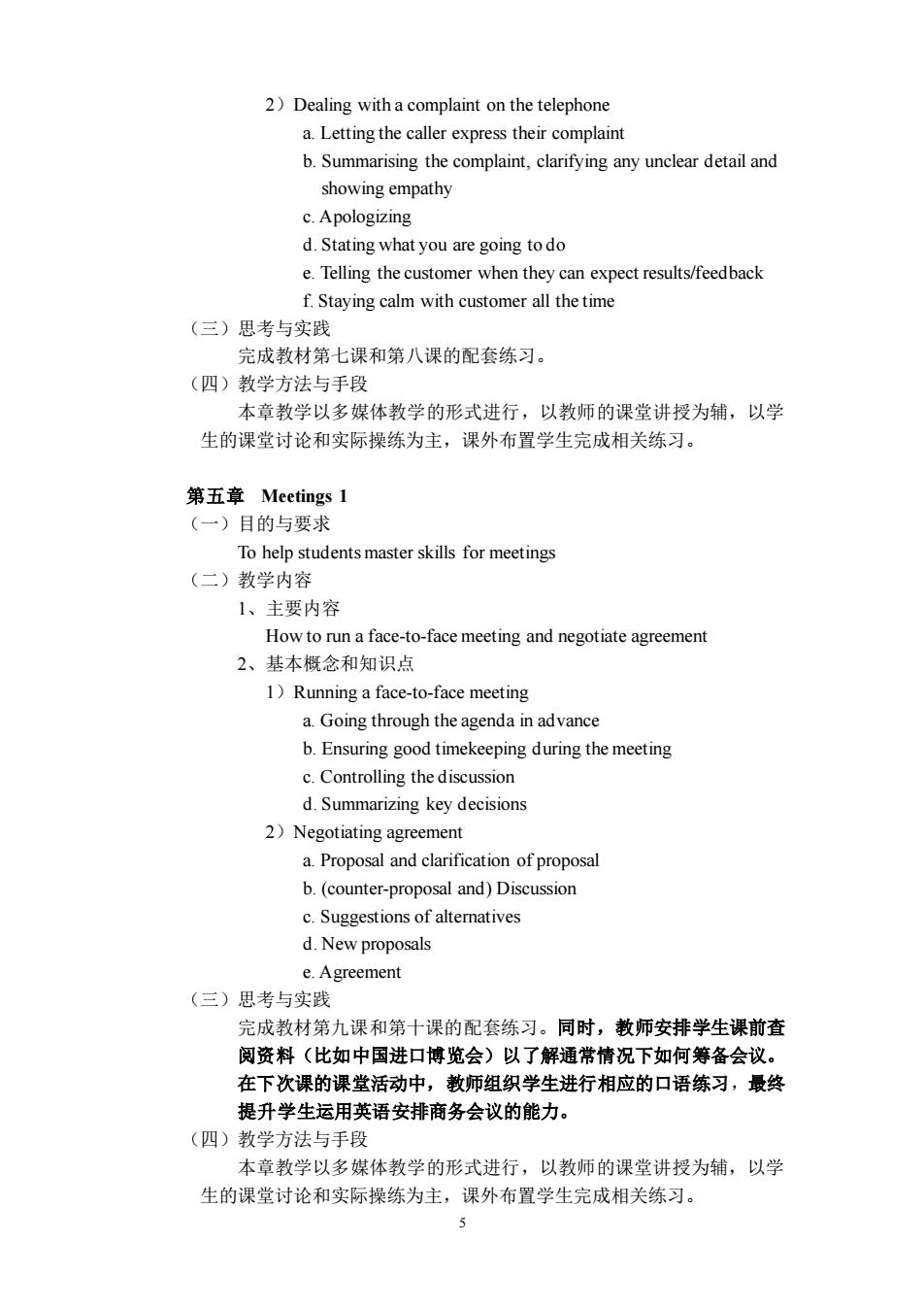
《商务英语中级口语》课程教学大纲 一、课程基本信总 课程代码: 课程名称:商务英语中级口语 英文名称:Intermediate Oral English for Business 课程类别:专业课 时:32 学分:2 适用对象:外国语学院的本科 二年级学生 考核方式:口试 先修课程:无 二、课程简介 《商务英语中级口语》是一门面向外国语学院本科一二年级学生的专业必修 课,目的在于通过商务英语口语课程的学习帮助学生熟悉各种商务场景,掌握有 效的商务沟通技能,提升学生用于商务场合的口语表达能力以及交际能力。同时, 基于课程思政理念,教师在授课过程中适时加入思政元素,丰富课堂教学和互动, 并进一步提升学生的口语表达水平 该课程讲授一个学期,每周2学时,共32学时。授课方式包括教师讲解, 学生主题发言,分组讨论,角色扮演和案例分析。课堂教学采用的教材为James Schofield&Anna Osborn编写的《科林斯商务英语:口语》. 教学重点如下: 建立联系: 打电话: 会谈: 陈述和会议 面试 学生学完该门课程后,应能达到以下要求: 1)掌握如何建立联系: 2)能有效地打电 3) 会谈基才 技巧 4)具体较好的批判性思维能力: 5)掌握面试技巧 《商多茧语中级口语》的数学评估句括形成性平估和终结性平估。前者主要 指教师根据学生的平时表现对学生的评估, 后者指单独命题组织的期末课程考 试。具体比例是:形成性评估占40%, 主要考虑因素包括出勤情况、课堂参与 的情况、课内外作业完成的情况:终结性评估即期末考试采取笔试的形式,满分 100分,占总成绩的60%
1 《商务英语中级口语》课程教学大纲 一、课程基本信息 课程代码: 课程名称:商务英语中级口语 英文名称:Intermediate Oral English for Business, 课程类别:专业课 学 时: 32 学 分: 2 适用对象: 外国语学院的本科一二年级学生 考核方式: 口试 先修课程: 无 二、课程简介 《商务英语中级口语》是一门面向外国语学院本科一二年级学生的专业必修 课,目的在于通过商务英语口语课程的学习帮助学生熟悉各种商务场景,掌握有 效的商务沟通技能,提升学生用于商务场合的口语表达能力以及交际能力。同时, 基于课程思政理念,教师在授课过程中适时加入思政元素,丰富课堂教学和互动, 并进一步提升学生的口语表达水平。 该课程讲授一个学期,每周 2 学时,共 32 学时。授课方式包括教师讲解, 学生主题发言,分组讨论,角色扮演和案例分析。课堂教学采用的教材为 James Schofield & Anna Osborn 编写的《科林斯商务英语:口语》。 教学重点如下: 建立联系; 打电话; 会谈; 陈述和会议; 面试 学生学完该门课程后,应能达到以下要求: 1)掌握如何建立联系; 2)能有效地打电话; 3)掌握会谈基本技巧; 4)具体较好的批判性思维能力; 5)掌握面试技巧 《商务英语中级口语》的教学评估包括形成性评估和终结性评估。前者主要 指教师根据学生的平时表现对学生的评估,后者指单独命题组织的期末课程考 试。具体比例是:形成性评估占 40%,主要考虑因素包括出勤情况、课堂参与 的情况、课内外作业完成的情况;终结性评估即期末考试采取笔试的形式,满分 100 分,占总成绩的 60%

Intermediate Oral English for Business is a course for English-major freshmen and_ It aims at familiarizing students with b kis o etive busines communication.eventally bepng thm ve tho ness occa ons,masterin abilities for speaking and communication on business occasions. The course lasts for a semester,32 periods in all.The teaching process consists of lectures by the teacher,thematic speech by students,group discussionole plays and case analysis.The textbook is Collins English for Bus ss by ames Schofield Anna Osbo Teaching focuses include: Networking; Telephoning: Meetings Presentations and conferences Interviews After studying the course,students are expected to: 1)master skills for orki 2)make phone calls effectively. 3)master skills for meetings; 4)develop good critical thinking abilities, 5)master skills for interviews The assessment of students is based on both formative assessment and conclusive assessment.The former refers to teacher's evaluation of students'class performance. while the latter the final examination.Formative assessment takes into account such factors as attendance,in-class performance,and grades in assignments,contributing 40%to the final total mark.Conclusive assessment refers to the final oral examination with the full mark being 100 points,contributing60%to the final total mark. 三、课程性质与教学目的 《商务英语中级 口语》属于外国语学院商务英语专业学生的必修课程 ,是促 使学生在未来商务场合中进行有效交流的重要保证。它既能为学生提供接触跨文 化情境下商务场合交流的机会,又能扩大他们的知识面,提高他们对语言的敏感 性,最终提升他们的商务场合交际能力。这门课程实践强,涉及面广,包括打电 话,会谈,面试等」 该门课程的目的是:通过教师的“精讲”和学生的“多练”,通过课堂讨论 和各种形式的课堂内外的实践,培养学生的口语表达能力和商务交际能力,发展 学生的兴趣,从而提高他们的综合文化素质。 四、教学内容及要求 第一章Networking 1 (一)目的与要求
2 Intermediate Oral English for Business is a course for English-major freshmen and sophomores. It aims at familiarizing students with business occasions, mastering skills for effective business communication, eventually helping them improve the abilities for speaking and communication on business occasions. The course lasts for a semester, 32 periods in all. The teaching process consists of lectures by the teacher, thematic speech by students, group discussion, role plays and case analysis. The textbook is Collins English for Business by James Schofield & Anna Osborn. Teaching focuses include: Networking; Telephoning; Meetings; Presentations and conferences; Interviews After studying the course, students are expected to: 1) master skills for networking; 2) make phone calls effectively; 3) master skills for meetings; 4) develop good critical thinking abilities; 5) master skills for interviews The assessment of students is based on both formative assessment and conclusive assessment. The former refers to teacher’s evaluation of students’ class performance, while the latter the final examination. Formative assessment takes into account such factors as attendance, in-class performance, and grades in assignments, contributing 40% to the final total mark. Conclusive assessment refers to the final oral examination with the full mark being 100 points, contributing 60% to the final total mark. 三、课程性质与教学目的 《商务英语中级口语》属于外国语学院商务英语专业学生的必修课程,是促 使学生在未来商务场合中进行有效交流的重要保证。它既能为学生提供接触跨文 化情境下商务场合交流的机会,又能扩大他们的知识面,提高他们对语言的敏感 性,最终提升他们的商务场合交际能力。这门课程实践强,涉及面广,包括打电 话,会谈,面试等。 该门课程的目的是:通过教师的“精讲”和学生的“多练”,通过课堂讨论 和各种形式的课堂内外的实践,培养学生的口语表达能力和商务交际能力,发展 学生的兴趣,从而提高他们的综合文化素质。 四、教学内容及要求 第一章 Networking 1 (一)目的与要求

To help students master networking skills (二)教学内容 1、主要内容 How to start a conversation and how to talk about jobs 2、基本概念和知识点 1)Starting a conversation a.Commenting on and asking about ordinary things b.Matching the mood of your conversation partner c.Asking and answering questions with interest and enthusiasm 2)Talking about jobs a.To be brief and precise b.To be relevant to your conversation partner c.Avoiding technical terms unless talking to a fellow expert d accentuating the positive aspects (三)思考与实践 完成教材第一课和第二课的配套练习。同时,在下次课的课堂活动 中,教师组织学生就当代中国人在人际交往中的会话方式和初次见 面的常见会话内容进行口语练习,最终提升学生在对外交际谈话中 的表达能力。 (四)教学方法与手段 本章教学以多媒体教学的形式进行,以教师的课堂讲授为辅,以学 生的课堂讨论和实际操练为主,课外布置学生完成相关练习。 第二章Networking2 (一)目的与要求 To help students master networking skills (二)教学内容 1、主要内容 How to show interest in other people and exchange information 2、基本概念和知识点 1)Showing interest in other people a.Echoing the key information to encourage further explanatior b.showing that you understand how your partner feels c.Reformulating in your own words what has been said 2)Exchanging information a.Offering your appropriate information first b asking questions indirectly c.Creating intimacy (三)思考与实践 完成教材第三课和第四课的配套练习。 3
3 To help students master networking skills (二)教学内容 1、主要内容 How to start a conversation and how to talk about jobs 2、基本概念和知识点 1)Starting a conversation a. Commenting on and asking about ordinary things b. Matching the mood of your conversation partner c. Asking and answering questions with interest and enthusiasm 2)Talking about jobs a. To be brief and precise b. To be relevant to your conversation partner c. Avoiding technical terms unless talking to a fellow expert d. Accentuating the positive aspects (三)思考与实践 完成教材第一课和第二课的配套练习。同时,在下次课的课堂活动 中,教师组织学生就当代中国人在人际交往中的会话方式和初次见 面的常见会话内容进行口语练习,最终提升学生在对外交际谈话中 的表达能力。 (四)教学方法与手段 本章教学以多媒体教学的形式进行,以教师的课堂讲授为辅,以学 生的课堂讨论和实际操练为主,课外布置学生完成相关练习。 第二章 Networking 2 (一)目的与要求 To help students master networking skills (二)教学内容 1、主要内容 How to show interest in other people and exchange information 2、基本概念和知识点 1)Showing interest in other people a. Echoing the key information to encourage further explanation b. Showing that you understand how your partner feels c. Reformulating in your own words what has been said 2)Exchanging information a. Offering your appropriate information first b. Asking questions indirectly c. Creating intimacy (三)思考与实践 完成教材第三课和第四课的配套练习

(四)教学方法与手段 本章教学以多媒体教学的形式进行,以教师的课堂讲授为辅,以学 生的课堂讨论和实际操练为主,课外布置学生完成相关练习。 第三章Telephoning1 (一)目的与要求 To help students master telephoning skills (二)教学内容 1、主要内容 How to conduct cold calling and confirm or rearrange appointments 2、基本概念和知识点 1)Conducting cold calling a.To be clear and concise b.Using questions c.Using titles d.Don't be offended by hostile behaviour 2)Confirming or rearranging appointments a confirming the topic date time and place b.To be ready with alternative appointment times c.Checking new requests if necessary (三)思考与实践 完成教材第五课和第六课的配套练习。 (四)教学方法与手段 本章教学以多媒体教学的形式进行,以教师的课堂讲授为辅,以学 生的课堂讨论和实际操练为主,课外布置学生完成相关练习。 第四章Telephoning2 (一)目的与要求 To help students master telephoning skills (二)教学内容 1、主要内容 How to make a complaint on the telephone and deal with a complaint on the telephone 2、基本概念和知识点 1)Making a complaint on the telephone a.Speaking to the person in a position to help you b.Stay as unemotional as possible c.Stating the problem clearly and calmly d.Stating what you want him/her to do e.Checking when you can expect results/feedback
4 (四)教学方法与手段 本章教学以多媒体教学的形式进行,以教师的课堂讲授为辅,以学 生的课堂讨论和实际操练为主,课外布置学生完成相关练习。 第三章 Telephoning 1 (一)目的与要求 To help students master telephoning skills (二)教学内容 1、主要内容 How to conduct cold calling and confirm or rearrange appointments 2、基本概念和知识点 1)Conducting cold calling a. To be clear and concise b. Using questions c. Using titles d. Don’t be offended by hostile behaviour 2)Confirming or rearranging appointments a. Confirming the topic, date, time, and place b. To be ready with alternative appointment times c. Checking new requests if necessary (三)思考与实践 完成教材第五课和第六课的配套练习。 (四)教学方法与手段 本章教学以多媒体教学的形式进行,以教师的课堂讲授为辅,以学 生的课堂讨论和实际操练为主,课外布置学生完成相关练习。 第四章 Telephoning 2 (一)目的与要求 To help students master telephoning skills (二)教学内容 1、主要内容 How to make a complaint on the telephone and deal with a complaint on the telephone 2、基本概念和知识点 1)Making a complaint on the telephone a. Speaking to the person in a position to help you b. Stay as unemotional as possible c. Stating the problem clearly and calmly d. Stating what you want him/her to do e. Checking when you can expect results/feedback

2)Dealing witha complaint on the telephone a.Letting the caller express their complaint b.Summarising the complaint,clarifying any unclear detail and showing empathy c.Apologizing d.Stating what you are going to do e.Telling the customer when they can expect results/feedback f.Staying calm with customer all the time (三)思考与实践 完成教材第七课和第八课的配套练习。 (四)教学方法与手段 本章教学以多媒体教学的形式进行,以教师的课堂讲授为辅,以学 生的课堂讨论和实际操练为主,课外布置学生完成相关练习。 第五章Meetings1 (一)目的与要求 To help students master skills for meetings (二)教学内容 1、主要内容 How to run a face-to-face meeting and negotiate agreement 2、基本概念和知识点 1)Running a face-to-face meeting a.Going through the agenda in advance b.Ensuring good timekeeping during the meeting c.Controlling the discussion d.Summarizing key decisions 2)Negotiating agreement a.Proposal and clarification of proposal b.(counter-proposal and)Discussion c.Suggestions of altematives d.New proposals e.Agreement (三)思考与实践 完成教材第九课和第十课的配套练习。同时,师安排学生课前查 阅资料(比如中国进口博览会)以了解通常情况下如何筹备会议。 在下次课的课堂活动中,教师组织学生进行相应的口语练习,最终 提升学生运用英语安排商务会议的能力。 (四)教学方法与手段 本章教学以多媒体教学的形式进行,以教师的课堂讲授为辅,以学 生的课堂讨论和实际操练为主,课外布置学生完成相关练习。 5
5 2)Dealing with a complaint on the telephone a. Letting the caller express their complaint b. Summarising the complaint, clarifying any unclear detail and showing empathy c. Apologizing d. Stating what you are going to do e. Telling the customer when they can expect results/feedback f. Staying calm with customer all the time (三)思考与实践 完成教材第七课和第八课的配套练习。 (四)教学方法与手段 本章教学以多媒体教学的形式进行,以教师的课堂讲授为辅,以学 生的课堂讨论和实际操练为主,课外布置学生完成相关练习。 第五章 Meetings 1 (一)目的与要求 To help students master skills for meetings (二)教学内容 1、主要内容 How to run a face-to-face meeting and negotiate agreement 2、基本概念和知识点 1)Running a face-to-face meeting a. Going through the agenda in advance b. Ensuring good timekeeping during the meeting c. Controlling the discussion d. Summarizing key decisions 2)Negotiating agreement a. Proposal and clarification of proposal b. (counter-proposal and) Discussion c. Suggestions of alternatives d. New proposals e. Agreement (三)思考与实践 完成教材第九课和第十课的配套练习。同时,教师安排学生课前查 阅资料(比如中国进口博览会)以了解通常情况下如何筹备会议。 在下次课的课堂活动中,教师组织学生进行相应的口语练习,最终 提升学生运用英语安排商务会议的能力。 (四)教学方法与手段 本章教学以多媒体教学的形式进行,以教师的课堂讲授为辅,以学 生的课堂讨论和实际操练为主,课外布置学生完成相关练习